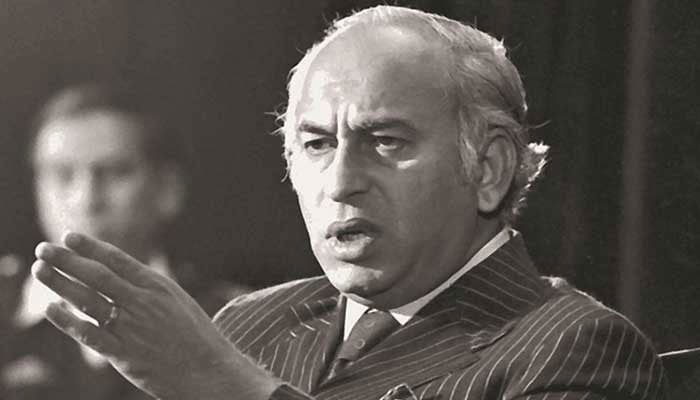Justice for Bhutto
The judicial murder of Zulfikar Ali Bhutto has haunted Pakistan’s judicial system ever since Bhutto was executed after an unfair and farcical trial
While nothing can undo the injustice Zulfikar Ali Bhutto faced when he was put to death in what has been called a judicial murder by historians and legal observers alike, Wednesday’s landmark Supreme Court ruling might go some way in acknowledging the wounds inflicted on not just the Bhuttos but all of democracy on that fateful day in 1979. The Supreme Court has said that the PPP founder Zulfikar Ali Bhutto did not get a fair trial and that due process requirements were not met. This judgment is a result of a presidential reference filed back in April 2011 under Article 186 of the constitution by the then-president Asif Ali Zardari to seek the court’s opinion on revisiting the Bhutto trial. Bhutto was executed on April 4, 1979, following an SC verdict in what the PPP has always called a trumped-up murder case. Initially, Zardari’s reference was taken up by the then-SC’s 11-member larger bench headed by former chief justice Iftikhar Muhammad Chaudhry, which held five hearings of the reference. On December 12, 2023, the reference hearing resumed under a nine-member bench headed by Chief Justice Qazi Faez Isa following a decision to fix an instant case under the Supreme Court (Practice and Procedure) Act, 2023. It is difficult to not agree with a justifiably emotional PPP Chairman and Bhutto’s grandson Bilawal Bhutto that the court’s verdict is historic and aimed at rectifying past mistakes.
The judicial murder of Zulfikar Ali Bhutto has haunted Pakistan’s judicial system ever since Bhutto was executed after an unfair and farcical trial. The Bhutto family has been waiting for justice for over four decades and this ruling can now give some sense of closure to them. Legal experts have acknowledged that Bhutto’s trial was a travesty of justice and the judiciary of Pakistan needed to address this issue. This was a case and a trial whose ramifications can still be felt across the country. Not only was Pakistan’s political future changed, but society as a whole is still reaping the nightmares brought on by the 11 years of Zia’s rule the country went through after Bhutto’s execution. In this sense, not only does the Bhutto family stand vindicated but so do democrats and political workers in the country – and the many Bhuttoists that still cling on to their deceased leader’s vision of Pakistan.
Over the years, the judiciary has been used as a tool by the powerful quarters. It is time those past sins of commission and omission by the judiciary are at least acknowledged. In this, Wednesday’s ruling becomes even more important – an acknowledgment that the judiciary was used to decide the fate of an elected politician who was the real representative of the people. The record had to be set right. And it is encouraging and commendable that the current Supreme Court found it fit to hold the institution accountable for its past mistakes. Perhaps, this is better articulated by Chief Justice Isa in his ruling: "We must therefore be willing to confront our past missteps and fallibilities with humility, in the spirit of self-accountability, and as a testament to our commitment to ensure that justice must be served with unwavering integrity and fidelity to the law."
-
 ChatGPT Caricature Prompts Are Going Viral. Here’s List You Must Try
ChatGPT Caricature Prompts Are Going Viral. Here’s List You Must Try -
 James Pearce Jr. Arrested In Florida After Alleged Domestic Dispute, Falcons Respond
James Pearce Jr. Arrested In Florida After Alleged Domestic Dispute, Falcons Respond -
 Cavaliers Vs Kings: James Harden Shines Late In Cleveland Debut Win
Cavaliers Vs Kings: James Harden Shines Late In Cleveland Debut Win -
 2026 Winter Olympics Snowboarding: Su Yiming Wins Bronze And Completes Medal Set
2026 Winter Olympics Snowboarding: Su Yiming Wins Bronze And Completes Medal Set -
 Trump Hosts Honduran President Nasry Asfura At Mar-a-Lago To Discuss Trade, Security
Trump Hosts Honduran President Nasry Asfura At Mar-a-Lago To Discuss Trade, Security -
 Cuba-Canada Travel Advisory Raises Concerns As Visitor Numbers Decline
Cuba-Canada Travel Advisory Raises Concerns As Visitor Numbers Decline -
 Anthropic Buys 'Super Bowl' Ads To Slam OpenAI’s ChatGPT Ad Strategy
Anthropic Buys 'Super Bowl' Ads To Slam OpenAI’s ChatGPT Ad Strategy -
 Prevent Cancer With These Simple Lifestyle Changes
Prevent Cancer With These Simple Lifestyle Changes -
 Air Canada Flight Diverted St John's With 368 Passengers After Onboard Incident
Air Canada Flight Diverted St John's With 368 Passengers After Onboard Incident -
 Experts Reveal Keto Diet As Key To Treating Depression
Experts Reveal Keto Diet As Key To Treating Depression -
 Inter Miami Vs Barcelona SC Recap As Messi Shines With Goal And Assist
Inter Miami Vs Barcelona SC Recap As Messi Shines With Goal And Assist -
 David Beckham Pays Tribute To Estranged Son Brooklyn Amid Ongoing Family Rift
David Beckham Pays Tribute To Estranged Son Brooklyn Amid Ongoing Family Rift -
 Jailton Almeida Speaks Out After UFC Controversy And Short Notice Fight Booking
Jailton Almeida Speaks Out After UFC Controversy And Short Notice Fight Booking -
 Extreme Cold Warning Issued As Blizzard Hits Southern Ontario Including Toronto
Extreme Cold Warning Issued As Blizzard Hits Southern Ontario Including Toronto -
 Lana Del Rey Announces New Single Co-written With Husband Jeremy Dufrene
Lana Del Rey Announces New Single Co-written With Husband Jeremy Dufrene -
 Ukraine-Russia Talks Heat Up As Zelenskyy Warns Of US Pressure Before Elections
Ukraine-Russia Talks Heat Up As Zelenskyy Warns Of US Pressure Before Elections




